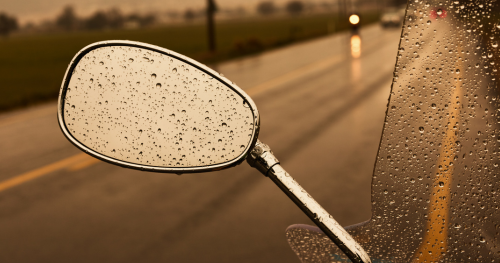
Riding a motorcycle is an exhilarating experience that comes with challenges, especially when dealing with wet weather conditions. Motorcyclists in Florida must exercise increased caution during or immediately following the frequent rain showers when the roads become wet and slippery.
Understanding how to navigate these conditions safely is crucial for every motorcyclist.
Here’s a comprehensive guide on how to ride a motorcycle in wet weather, including the risks involved and tips to avoid accidents.
The Danger of Wet Roads for Motorcycle Riders
In 2021, there were 5,932 motorcyclist fatalities across the nation. In Florida, motorcycles represented 3.5% of all registered vehicles but around 17% of the state’s traffic fatalities in 2019.
Riding a motorcycle on wet roads heightens the risk of accidents and injuries. This increased danger stems from reduced traction when water, oil, and road residue mix, creating a slick surface that compromises the stability of two-wheeled vehicles.
The situation is worsened by reduced tire grip, which can lead to longer stopping distances and reduced maneuverability. Rain also decreases visibility for motorcyclists and other drivers, increasing the risk of collisions.
Wet conditions require a more cautious riding approach, with gentle acceleration, braking, and cornering to avoid abrupt or aggressive maneuvers that could result in a loss of control.
Proper Gear and Preparation
Before heading out on a wet weather journey, equip yourself with the right protective gear:
- Start by putting on a high-quality, water-resistant helmet featuring an anti-fog visor for clear visibility.
- Wear clothing made of fabric designed to repel water, like GORE-TEX, PVC, or nylon, to keep you dry and comfortable.
- Choose gloves and boots that offer waterproof protection and enhanced grip to help maintain control in slippery conditions.
Prepare your motorcycle by ensuring the tires have an adequate tread depth of 3/32” or greater per Florida law and are inflated to the recommended pressure for optimal traction on wet roads. Conduct a thorough check of all headlights, brake lights, and indicators to boost your visibility to others.
Tips for Riding Your Motorcycle in Wet Weather
To ensure your safety while riding a motorcycle in wet weather, adopt a cautious and proactive approach by using these tips:
- Reduce Your Speed: During wet conditions, slow down to below the posted speed limit. This will give you more time to react if you encounter an obstacle or lose traction. Speed limits are set based on ideal conditions, not rain.
- Increase Following Distance: Maintain a safe following distance from the vehicle in front of you, around four to five seconds. Wet roads mean longer braking distances, so having extra space between you and the vehicle ahead can prevent rear-end collisions.
- Smooth and Gentle Inputs: Avoid sudden and abrupt throttle, brake, or steering inputs. Smooth and gentle actions on the controls will help maintain stability and prevent skidding or sliding.
- Use Both Brakes: Use both front and rear brakes, but apply them gently and progressively to avoid locking up the wheels or skidding.
- Stay Visible: Turn on your headlights, even in the middle of the day, to help other drivers notice you, as required by law. If you turn, use your signal early and ensure that those behind you can see your intentions.
- Avoid Puddles: Puddles and standing water can conceal potholes and debris that can easily cause accidents for motorcyclists.
- Use Tracks of Vehicles Ahead: The tires of cars ahead can displace water on the road, creating a drier path that offers slightly better traction. Avoid the middle of the lane where oil and fluids accumulate, especially in the first few minutes of rainfall.
- Know the Road: Familiarize yourself with the route. Be aware of areas prone to flooding or accumulation of debris, and avoid them if possible.
Injured in a Motorcycle Accident? Contact Aigen Injury Law
Riding a motorcycle in wet weather can increase your risk of an accident, even if you take safety precautions. Other motorists may lose control of their vehicle or fail to drive safely, resulting in harm to you or your motorcycle.
If you’re hurt by another driver on Florida’s roads, our Miami motorcycle accident lawyer can help you hold the negligent driver liable in a personal injury claim. This can help you recover compensation for your medical bills, lost earnings, and pain and suffering due to the crash.
Contact our legal team today for a free consultation and let us assist you in securing the settlement you deserve.